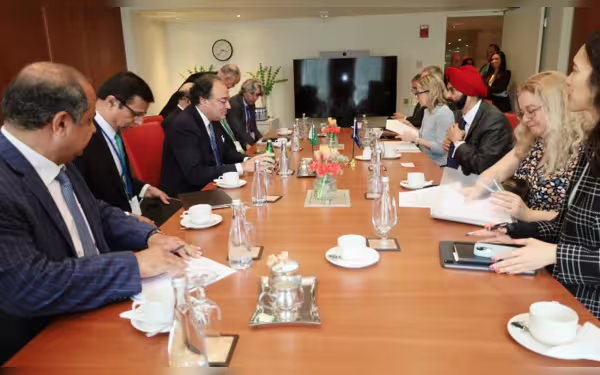Thursday, July 4, 2024 05:48 PM
World Bank and Pakistan Collaborate on Economic Reforms
- World Bank supports Pakistan's digitalization and reform efforts
- Partnership with ADB and USIDFC to boost investments in Pakistan
- World Bank approves financing for digital economy and flood prevention projects
 Image Credits: WE News -
Image Credits: WE News -The World Bank pledges support to Pakistan for economic reforms, digitalization, and flood prevention projects. Collaborations with ADB and USIDFC aim to boost investments in Pakistan's economy.
The World Bank has pledged its full support to Pakistan for implementing reforms and digitalization initiatives to stabilize the economy and boost revenues. Finance Minister Muhammad Aurangzeb recently met with World Bank Group President Ajay Banga to discuss Pakistan's progress under the Standby Arrangement program and ongoing reforms in key areas such as taxation, energy, and privatization. Both parties agreed on the importance of a 10-year rolling Country Framework Plan to guide future collaborations. The minister also extended an invitation to the president to visit Pakistan.
In addition, Minister Aurangzeb held discussions with Asian Development Bank President Masatsugu Asakawa to strengthen Islamabad's partnership with the ADB, safeguard concessional financing, and enhance the project pipeline. Furthermore, a meeting with US International Development Finance Corporation CEO Scott Nathan explored opportunities to expand investments in Pakistan, emphasizing innovative financing models and support for local and foreign investors.
Recently, the World Bank approved $149.7 million in financing for Pakistan's 'Digital Economy' and 'Flood Prevention' projects. The 'Digital Economy Enhancement Project' aims to enhance financial systems through technology and data-driven decision-making, crucial for Pakistan's economic and social progress. Additionally, funds have been allocated for improving Sindh's barrages to bolster flood protection and canal system resilience against extreme weather events.
Looking ahead, the World Bank projects a gradual decline in Pakistan's inflation rate, from 26% in the current fiscal year to 11.5% by 2025-26. The bank attributes the recent inflation surge to rising electricity and gas prices, impacting production costs significantly. Addressing these challenges will be crucial for Pakistan's economic stability and growth.













